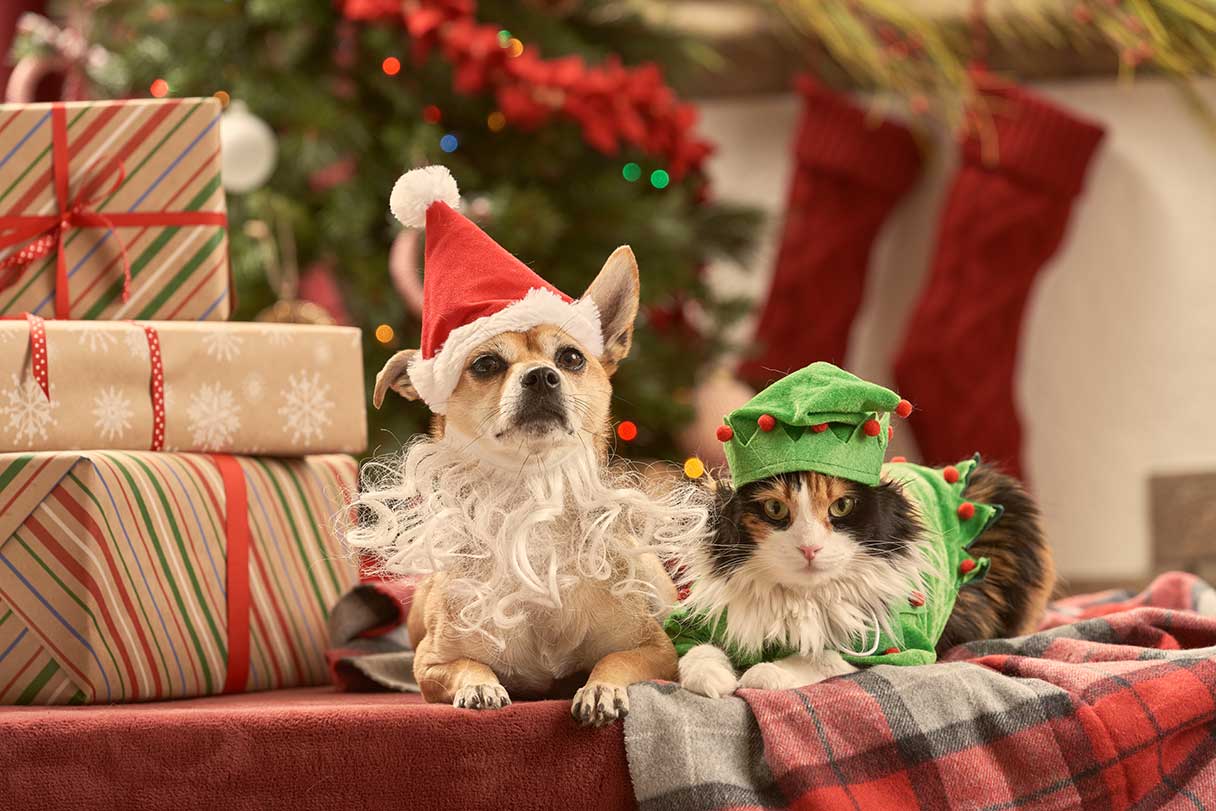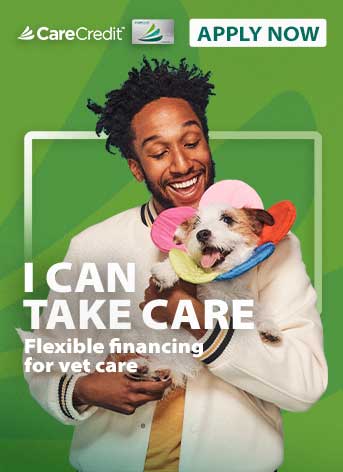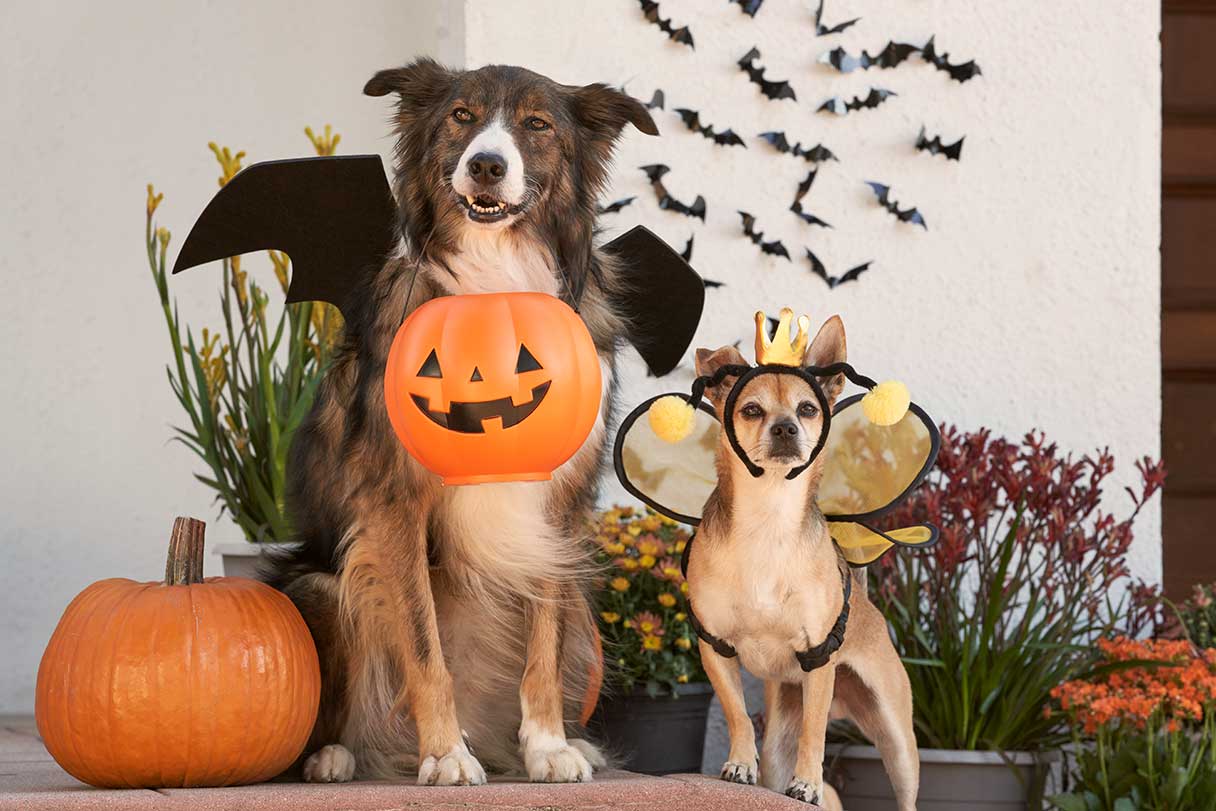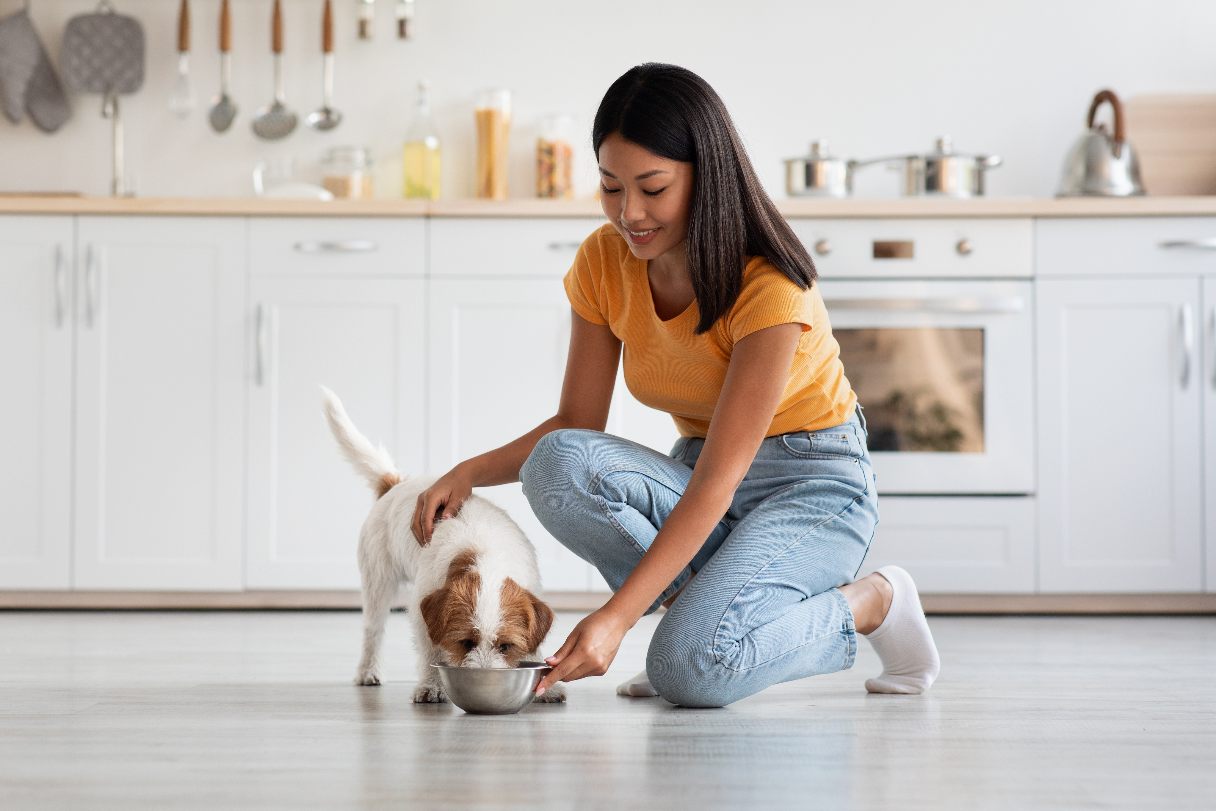The holidays are a busy time for everyone, including our pets. With all of the hustle and bustle, it's easy to become distracted from everyday pet safety, and that can put your best pal at risk. Fortunately, there are simple steps you can take to avoid dog disasters and cat catastrophes — and ensure a holly, jolly season for all. Below, we share 11 common holiday hazards for pets, along with actions you can take to help keep your pets safe.
1. Alcohol
Thankfully, many dogs aren’t interested in alcoholic beverages, and most of your guests will likely know not to give your dog alcohol. If your dog does get a lick or two of an adult beverage, the impact is often mild but varies based on the size of your pup and the amount they have consumed.
If you have concerns or your dog exhibits any abnormal behavior, take them to their veterinarian immediately. It’s also important to consider if the drink has any additives that may be more dangerous for your dog: xylitol (an artificial sweetener), coffee, chocolate or spices.
Pet safety tip: Dogs should never drink beer brewed for humans, so keep your drinks out of their reach. If you have concerns during a holiday party, you may want to crate or keep your pup in another room during the festivities.
2. Antifreeze
As the weather gets colder and you have more guests to your home for the holidays, the chance of antifreeze leaking onto your driveway becomes greater. Ethylene glycol, the main ingredient in most types of antifreeze, is sweet, which may make your pup want to investigate. But a small amount can be lethal to your dog — even if they lick their paws after walking through the liquid. Dogs must be treated as soon as possible upon ingestion, so if you think your dog has ingested even a little bit, take them to the veterinarian immediately.
Pet safety tip: Use dog-safe antifreeze that contains propylene glycol instead of ethylene glycol, or keep your antifreeze in sealed, leak-proof containers. Always check your driveway and garage for brightly colored puddles and avoid those areas when walking your dog.
3. Bones
It may be tempting to toss your dog a bone as a holiday treat but think twice. Chicken or turkey bones from holiday meals can pose choking hazards or obstructions, and small pieces of bone can splinter off and cause damage to your dog's digestive tract.
"Bones can get stuck on teeth. They can get stuck in the back of the throat. They can get stuck in the esophagus and the gastrointestinal tract," said Ayeley Okine, DVM, in a Care Experts vodcast about dog diet and digestion.
Even dog chew bones purchased as gifts can pose a hazard, as many are too hard and can cause fractured teeth. Round marrow bones can also get stuck around the lower jaw, requiring a trip to the veterinarian for removal.
"I tend to not recommend giving bones at all because I worry that a lot of dogs aren't used to having them," Dr. Okine said. "Or if they're in a situation with other pets, they'll gobble these things down and not chew on them safely."
Pet safety tip: If you want to give a special chew treat to your dog for the holiday, stick with pet-approved chews from the pet store, not cooked bones from your table. When choosing a chew treat, a good rule of thumb is that if you can't indent the chew with your thumbnail, it's too hard for your dog's teeth and could cause a fracture. Remember to always supervise your dog while chewing and take the chew away when it becomes small enough to swallow.
4. Candles
Candles are a lovely way to decorate for the holiday season, and for some, they are a key part of the holiday tradition. But with pets around, they can be dangerous.
Candles can not only pose a fire hazard, but they can also potentially cause serious burns to curious noses and paws. Candles can easily be tipped over or pushed around by an inquisitive pet, posing a big threat to both pets and your home.
Pet safety tip: Never leave lit candles unattended. Keep curious pets far away from candles, and consider only using candles in rooms that pets cannot enter.
5. Christmas Trees and Holiday Decorations
A Christmas tree, whether real or artificial, is a beautiful addition to your home during the holiday season, but it also can pose a danger to your pets.
Cats are notorious for climbing Christmas trees and knocking them down, causing injury to themselves and other pets. Curious puppies or kittens may try to consume the needles, which can be very abrasive to the esophagus.
Water additives used for keeping Christmas trees fresh may also be toxic to pets if consumed and are susceptible to bacteria growth, which can cause problems for your pet.
Pets may also chew on Christmas tree lights or consume tinsel, leading to dangerous gastrointestinal (GI) tract obstruction that requires emergency veterinary care to address. Anything considered a linear foreign body — garland, tinsel, fabric, string, bows or ribbon — can be very dangerous as it moves through the intestine.
Last but not least, keep battery-powered decorations away from your pets, too. If your pet punctures the battery, alkaline or acidic liquids can leak out and cause corrosive injury to the mouth and other body parts. If this happens, flush your pet’s mouth and call the veterinarian and/or a pet poison hotline immediately.
Pet safety tip: Use solid barriers to keep pets away from the tree or put the tree in a room that pets can't access. If this isn’t possible, be sure to anchor your tree to reduce the chance of it tipping over. Place breakable ornaments high on the tree where they are less likely to be disturbed by a curious pet. And avoid using tinsel, which is often tempting to cats and extremely harmful if consumed.
6. Electrical Cords
Many of us decorate for the holidays with extra lights and electric decor, and that means electrical cords and extension cords galore. Unfortunately, pets may chew on electrical cords, leading to dangerous burns or electric shock. Electrical cords can also pose a trip hazard for pets and humans alike.
Pet safety tip: Keep electrical cords out of your pet's reach, and consider unplugging them when you are not supervising. If your pet likes to chew, consider using bitter apple spray (available at pet stores or online) on the cords to make them taste bad, so your pet will be less likely to take a bite.
7. Festive Foods and Sweet Treats
Tasty treats abound during the holiday season, but that means there are hazards for your pet at every table, too.
Chocolate, a holiday staple, is toxic to cats and dogs, particularly if it's dark chocolate or if it's consumed in significant quantities. Table scraps can cause GI upset or even pancreatitis, a painful inflammation of the pancreas that can lead to vomiting, diarrhea and abdominal pain. Grapes and raisins, found in some holiday recipes, can cause acute kidney failure. Artificial sweeteners like xylitol — often used in sugar-free candies, gums and baking — can lead to acute hypoglycemia, collapse and even death if your pet eats even a small amount.
And don’t forget about walnuts or pecans — both contain a toxic-to-dogs compound called juglone, which can cause severe gastrointestinal and/or neurological issues. They may also contain molds that can be toxic and pose a choking hazard due to their small size.
Be careful with holiday treats and table scraps as too many extras can cause digestive upset and excess weight gain. Remember that you may not be the only one slipping your pet some extras — your guests may be sharing their scraps with your pet, too!
Pet safety tip: While it's OK to give your pet the occasional holiday treat, stick to pet treats and a small dose of healthy human foods. A good rule of thumb is that treats should make up no more than 10% of your dog's total daily calorie intake to prevent excess weight gain.
8. Fireworks
Many pets are sensitive to noise, and the holidays, while joyous, can be a noisy occasion.
Fireworks, a staple for New Year's celebrations in many regions, can be terrifying for many pets. This can lead to stress, anxiety and panic, sometimes even resulting in pets becoming lost or injured.
Pet safety tip: Don't wait — talk to your veterinarian today about your options for fireworks phobia. Your veterinarian may recommend medication to help keep your pet calm and comfortable during the festivities. Be sure to keep pets indoors during holiday parties and fireworks, and give them a safe space, such as a quiet room or crate, where they can comfortably relax away from the noise.
9. Holiday Plants
Decorating with or gifting holiday plants like poinsettias, lilies and mistletoe is a long-standing tradition. Unfortunately, these common holiday plants are toxic to dogs and cats.
Poinsettias are irritating to the mouth and the GI tract, sometimes to the point of causing vomiting. Holly contains saponins, which can cause vomiting, diarrhea and depression. And while American mistletoe may grant you a kiss, it also causes vomiting, diarrhea, difficulty breathing and a low heart rate when ingested by a curious pet.
Pet safety tip: Keep holiday plants well out of your pet's reach, especially if your pet is the curious type who may try to take a bite.
10. Party People
The holidays are the time of year for seeing friends and family, but this can be super stressful for your pets. Having new people in the house — not to mention the different noise and activity levels — can be a big source of anxiety for many pets. Guests coming and going can also inadvertently provide an avenue for escape for a frightened pet, creating extra trouble.
Pet safety tip: While guests are visiting, provide your pets with a haven, such as their own quiet room or a cozy crate to curl up in. Keep them safely locked away from open doors to prevent escape. Limit interactions with guests to help reduce your pets' stress. And ask your veterinarian about calming supplements or medications to help ease your pets' anxiety during these stressful times.
11. Trash
Is your pet a dumpster diver? Even if your pet does not usually like to get into the trash, holiday trash is filled with extra goodies like table scraps that can entice a curious pet.
Be extra careful with your holiday leftovers and scraps, as eating trash or even leftovers can lead to big threats for pets. GI upset, pancreatitis and bowel obstruction are just a few of the holiday hazards your pet could encounter after diving into your trash can.
These can be emergency conditions, so be extra cautious with your holiday waste to spare yourself the vet trip.
Pet safety tip: To avoid mishaps, dispose of your holiday trash in a sealed, pet-safe container. Also, make sure leftovers and table scraps are disposed of quickly and securely.
What to Do in a Holiday Hazard Emergency
If your pet experiences a holiday hazard emergency, first, do not panic. Contact your veterinarian or your local veterinary emergency clinic for guidance. If your pet has eaten something they should not have eaten, do not induce vomiting unless directed to do so by your veterinarian. When in doubt, take your pet to your local veterinary emergency clinic for immediate veterinary care.
CareCredit Credit Card Financing for Pets
Taking good care of your pet's well-being from nose to tail is essential. Make sure to stay up to date on their regular checkups at the vet to help keep your pet happy and healthy for a lifetime of love. You can use your CareCredit credit card for pet care throughout the year for routine veterinary services as well as emergencies and surgeries.* Use our Acceptance Locator to find a veterinarian near you that accepts CareCredit.
CareCredit is there for you and your pet every step of the way; continue your wellness journey by downloading the CareCredit Mobile App to manage your account, find a provider on the go and easily access the Well U blog for more great articles, podcasts and videos.
In addition to pet care, you can also use your CareCredit credit card for dentistry, cosmetic, vision, hearing, health systems, dermatology, pharmacy purchases, spa treatments and so much more within the CareCredit network. How will you invest in your health and wellness next?
Expert Reviewer
Dr. Kathy Wiederkehr (Wentworth), V.M.D.
Dr. Kathy Wiederkehr (Wentworth) has been practicing veterinary medicine at pet care facilities in California since 2001. Most recently, she served as medical director of the VCA PetPoint Medical Center and Resort in Irvine. She is a graduate of the University of Pennsylvania School of Veterinary Medicine and became board-certified as a diplomate in Canine and Feline Practice by the American Board of Veterinary Practitioners in 2010.
Author Bio
Abbie Mood is a freelance writer with more than 15 years of experience. She has worked with clients of all sizes to create compelling content and she has written for the American Kennel Club, Marriott Bonvoy, Women’s Health Online, Headspace and more.








